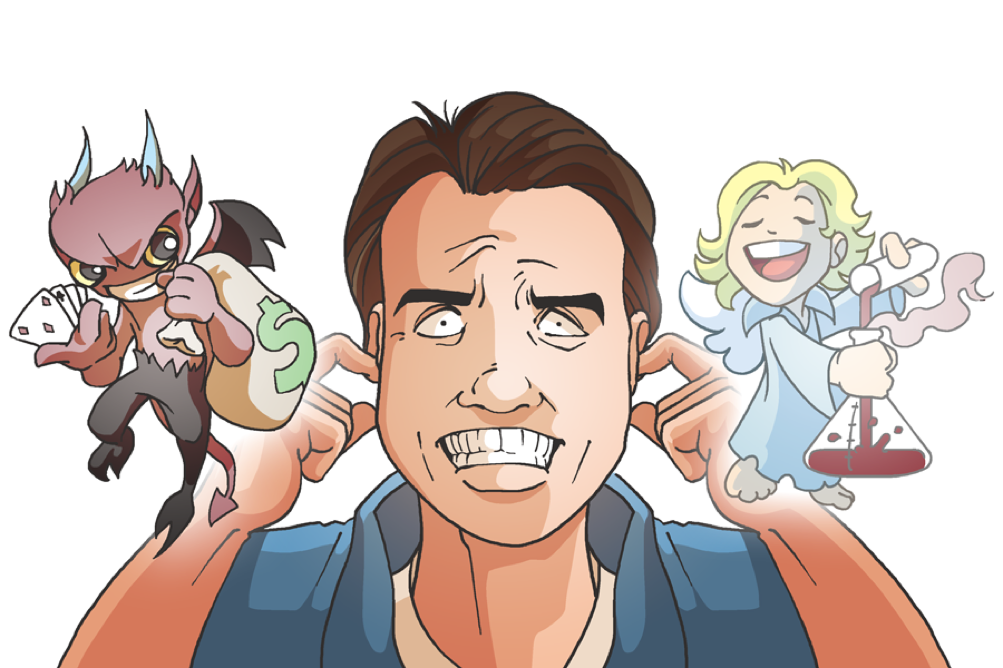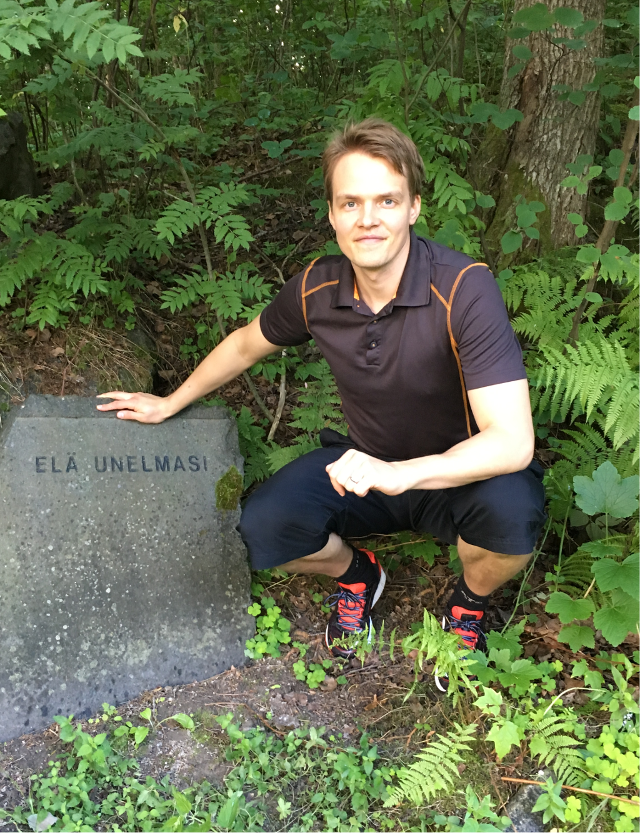Identity of your game
Identity is always built upon something. It could be a trait, a skill or a quirk. It’s extremely difficult to maintain a calm state of mind if some aspect of oneself inspires great admiration in others. We’re all susceptible to flattery and recognition. We covet a place and status in our own tribes. We often seek the kind of company that can increase our status the most. That is our place. That is where we’re appreciated.
Evolution wise, it all makes sense. Our brains reward us for success and make us direct our interest and resources to where we’re most likely to be able to put food on the table and where our status is highest. Status is important; a high status is the way to copulation. A partner is most often found in the same tribe. The same values, genes and traits will be strengthened and the resulting offspring will have the best weapons possible to take on the fight for the status of the next generation. This biological instinct and mechanism ensures the survival of our genes amidst the storm of evolution.
This natural operational model is also widely exploited and abused.
Values – A philosophy of games
The concept of values is a confusing one. They could be seen as the game philosophy of our lives. They’re at the root of every big decision we make.
Values can be like an inner voice, one with physiologically definable origins. The brain has a part called insula, or insular cortex. It processes a countless amount of small sensory nuances which integrate with the conscious mind.Someone wise once said:
Make the big decisions with your heart and the small ones with your head.The subconscious and memory of our lives holds all of our experiences, education and constructed understanding with its moods and facts. With every decision we make, they send a message to our conscious mind that allows us to feel something.
”This feels wrong. ”
”This feels right.”
”Something’s not right here.”Often, the most important decisions of our lives are based on those feelings. You might not be aware of all the factors behind the feeling. Sometimes a short glance at the big picture is enough for the feeling. I often still experience that same feeling when I walk past a RAY (Finland’s Slot Machine Association) arcade, where casino lights flicker and the sleeve of a VIP customer’s scuffed jacket sways as its owner sends the fruits on another round around the Skinner box.
Operant conditioning chamber, Wikipedia
The same feeling is even stronger when I converse with a young poker pro who confidently recounts having dropped out of school to focus on a full time poker career, encouraged by a large tournament win a few years back.
I gain his attention and admiration by talking about having played high stakes poker with large hourly wages for years by now. The need for boasting disappears from his eyes and demeanor, shifting instead to broadcast a hint of fear, raised blood pressure and a burgeoning stress disorder. Slumping shoulders and nervous articulation accompany the confession, as he admits he’s currently suffering from a long losing streak. At least he still has some savings.
In the background, a toast is proposed for the champion who has set the table handsomely as usual. Gotta hang on to that preconceived role. All role models visibly flaunt their living standards.
Just have to keep working on the game and watch all those teaching videos, and the bad luck will change, he asserts. I try to subtly redirect the conversation towards the importance of schooling, but the young lad perceives school as a hindrance to developing his game.
A quick evaluation of the boy’s competence, weakness of identity, psychology, physiology and the lack of understanding regarding his position in life makes me feel ill. His body has already adapted to dealing with the stress caused by the game, his mind set on the future he foresees. The only feeling I have is the feeling of wrongness. I don’t think the lad knows the kind of game he’s playing or the kind of future he’s playing for, with his life as a chip in some much greater game.Poor thing.
Luckily, I only ever had to face an impersonal name tag, virtually presented on a computer screen. Those never conveyed a life unlived, a distorted identity, social issues or malfunctions in the brain and hormone secretion.
Too much information might have been too much to digest for a predator this delicate.
The hand rankings
Contrary to poker, life has all sorts of hand rankings. In some games of life, a three of a kind can beat a full house. In others, the more traditional ranking system is appropriate. Everyone defines the rankings of their own lives.
There have been times when I’ve moralised and judged too strongly. I thought ways such as being a professional poker player or working in the gambling industry irresponsible methods of earning a living. I was living a conflict. Then again, something most people in their twenties can only dream of was within a hand’s reach for me. I could tour the world, enjoy a life of freedom, pick up girls at bar counters and play poker under palm trees while sipping a Piña Colada. All the while obtaining an economic liberty by playing the game I loved.

At the same time a feeling of responsibility and obligations, emerging from some deep depths of my mind, weighed heavily on my shoulders. I was faced with a frighteningly realistic vision of a grumpy old gamer in his fifties, buying vintage whiskey by the pound, living a hollow existence devoid of substance, gazing down upon his creation from an ivory tower; A casino complex optimized to imprison the human mind like a Skinner box, as he ponders the heritage he’s leaving behind during his brief time on this earth, hoping he made the right choices; Is this what it’s like to be successful?

Gambler – a social animal
It was only after I’d spent some time studying psychology that I understood the innate need to be accepted as you are. I was ashamed of my gamer identity, faced with all the people that I saw laboring to benefit society, all the people who scorned the idea of gambling as a career.
Adam Smith believed that human beings are driven by moral sentiments and their desire to seek and be worthy of the admiration of others.Social AnimalCondemning gambling as a career was how I clung to my worldview, my values and choices. The same phenomenon is apparent in communities with strict tenets and moral values. For many of these groups, ignoring the differing worldviews of others is nigh impossible. Censure, rejection and disdain, not to mention the threat of perdition, are ways of strengthening one’s beliefs on their chosen path.
No one knows the truth. Do actual values even exist?
Happiness is the state of consciousness which proceeds from the achievement of one’s values.Ayn RandTo protect my worldview, I avoided forming a clique made of poker players. Like attracts like, after all – people like to spend time with others who share their worldview, discussing common worries and values. A shared worldview is safe, increases solidarity and has improved chances of survival in tribal skirmishes throughout evolution. One of the intriguing aspects of humanity is the way values, worldviews and energy are passed on.
I could truly relate to the fearlessness, attitude, freedom, sense of adventure, candor, frankness, courage and predator instinct of gamblers. Even so, I had a feeling that something was missing. I longed for something more substantial and worthwhile. Similar longing was rarely apparent in the demeanor of other gamblers. It was difficult to find any kindred spirits, but I didn’t want to lose that side of myself either. Impulses are like the waves of a stormy sea – it’s difficult to glimpse the horizon when you’re being buffeted by sea foam.
It took me around five years to finally stabilize my worldview, life philosophy and career choice enough to stop questioning the greater choices in my life. I can steadfastly resist the pull of casino lights, the wonderful sound signaling the beginning of your turn in netgames, the feeling of accomplishment accompanying a victory by bluffing and the admiration that comes with being a successful gambler. Understanding your own position in the world is as important as understanding your position at the game table, with one difference – one of these games is played with much higher stakes.
After several years, I started spending some time in poker circles. As my self confidence improved, so did my acceptance of my worldview and myself as I am. I realized that we’re all individuals with our own needs, passions and paths in life.
I’ve made a few friends through poker. I don’t envy their millions or lifestyles and they don’t envy my lifestyle or way of thinking. Or maybe we both envy each other, just a little. And perhaps even slightly pity the other. We’re both in the right.
While I was searching for a game table of my own, I also learned a lot about various motivation theories. Most sources reiterated three things that a person requires:
Autonomy: The feeling that you have an effect on your work. You’re not being controlled by some higher force.
Mastery: The feeling that you’re advancing in your work. We have an innate need to improve.
Purpose: The feeling that your work matters.For me, it was obvious which one was missing from my poker career.


